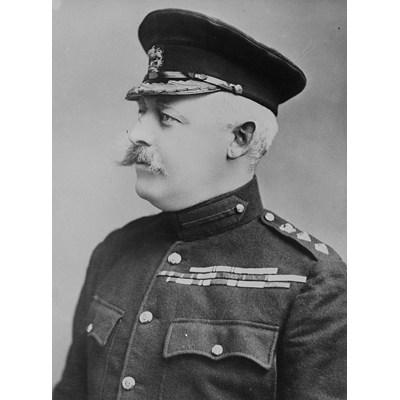Grierson, James Moncrieff (1859 - 1914)

Lieutenant General, 2nd Bn. Army Corps
Buried at Glasgow Necropolis
Commemorated at Glasgow Cathedral
Lieutenant General Sir James Moncrieff Grierson Knight Commander of the Order of the Bath (KCO), Companion of the Order of St Michael and St George (CMG), Commander of the Royal Victorian Order (CVO), ADC was born in Glasgow on 27 January 1859.
James "Jimmy" Grierson was the second son of George Moncrieff Grierson, a Glasgow merchant, and his wife Allison Lyon Walker.
Grierson was one of the pre-war British Regular Army's most accomplished and interesting senior officers. After his commission in the Royal Artillery on 9 October 1877 he accumulated an impressive amount of active service in the late Victorian army's colonial campaigns, including Egypt (1882), Suakin (1885), the Hazara Expedition (1888), South Africa (1900) and China (1900-1). He also passed staff college (1884). In the decade before the outbreak of the Great War he moved through a series of important appointments, including Director of Military Operations at the War Office (1904-6) in the aftermath of the Anglo-French entente, GOC 1st Division (1906-10) and GOC Eastern Command (1912-14).
During the army manoeuvres of 1912 Grierson famously worsted his rival, Douglas Haig, principally through the use of aerial reconnaissance, a tactic that he only reluctantly adopted after forceful lobbying by his cavalry commander, Charles Briggs.
Grierson was an accomplished linguist. He was the British Army's leading authority on the armies of Germany, Russia and Japan, on all of which he published books. Grierson was also a noted bon viveur, with a love of music, fine food and wine, good company and amateur theatricals. He once commented that he had fought his best battles 'with a knife and fork'. Unfortunately, he had the figure to match.
Twelve days into his wartime command of II Corps, on 17 August 1914, Sir James Grierson died of a heart attack in the train taking him to the front. He remains one of the great 'might-have-beens' of the war.
Grierson's body was repatriated, a practice allowed at that time, and is buried in the Glasgow Necropolis with his sister, father and mother. These were full interments.
The Sir James Moncrieff Grierson prize for languages was later established at the Royal Military Academy Sandhurst.
Reproduced with thanks to Scottish Military Research Group - www.scottishmilitaryresearch.co.uk




